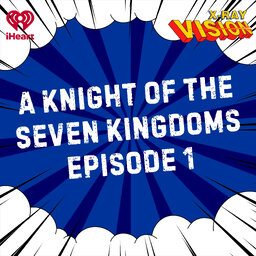Batman: The Caped Crusader (Episodes 5-10) with Marc Bernardin
Night falls once again upon Gotham! Join us as we dive into the second half of Amazon’s Batman: The Caped Crusader. We’ve got ghosts! We’ve got corrupt cops! We’ve got missing children! But best of all, we’ve got the legend Marc Bernardin (writer for Caped Crusader, Eyes of Wakanda, and more) to join us as we navigate the supernatural, the original take on Harley Quinn, and the season’s Harvey Dent storyline.
Plus, Jason and Rosie saw the Crow! And they have a couple thoughts!
Follow Marc Bernardin @marcbernardin
Support Marc's Kickstarter!
Follow Jason: twitter.com/netw3rk
Follow Rosie: IG & Letterboxd
Follow X-Ray Vision on Instagram
Join the X-Ray Vision Discord
In 1 playlist(s)
X-Ray Vision
Nerd-culture podcast X-Ray Vision takes listeners on a journey through the zeitgeist-iest (patent pe…Social links
Follow podcast
Recent clips

A Knight of the Seven Kingdoms Episode 1 Recap and Reaction
37:57

NEWS: Dave Filoni to Replace Kathleen Kennedy at Lucasfilm, First Look at Sophie Tuner as Lara Croft
18:07

STOCK WATCH: Our Pop Culture Predictions for 2026
52:10
 X-Ray Vision
X-Ray Vision